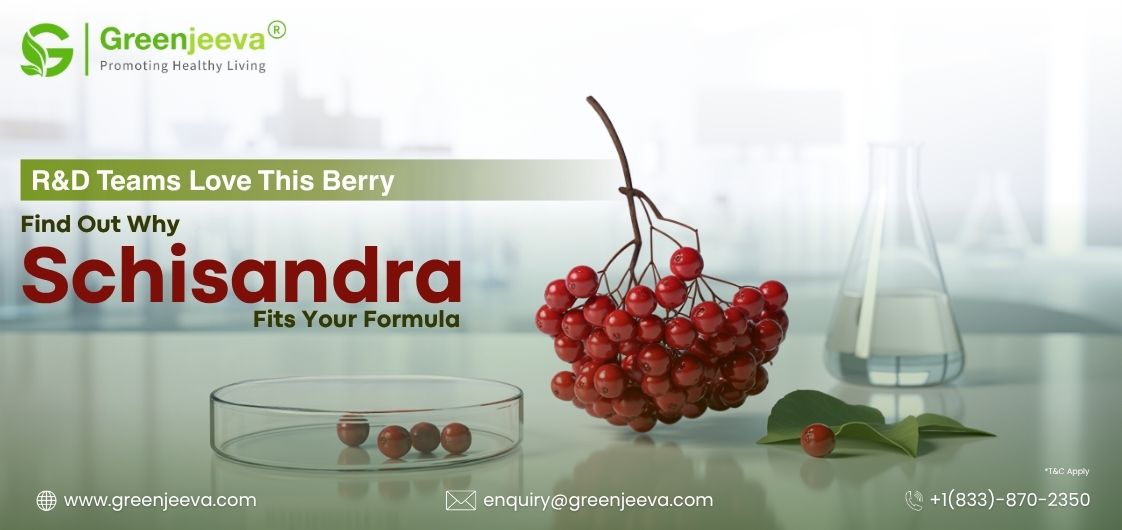
You're building the future of functional products—and every input matters. Between sourcing hurdles and formulation pressures, finding ingredients that hit the mark on purity, documentation, and performance is no easy feat. That’s why more R&D teams are leaning into clean-label botanicals like Organic Schisandra Berry Powder
Traditionally known for its use across Asia and Northern Europe, this vibrant red berry has made its way into modern functional formulations not because of a trend, but because of its formulation-friendly nature.
In this post, we explore why sourcing Schisandra Berry Powder in bulk makes sense for R&D teams working on scalable, natural product lines—and what to look for when choosing a supplier.
Sourced from the Schisandra chinensis plant, Schisandra berries are processed into a fine, reddish powder that holds value in clean-label product innovation. The USDA Organic variant ensures it’s grown and processed without synthetic additives, aligning with formulation integrity and consumer expectations.
What makes it stand out? It contains a range of bioactive compounds like lignans and naturally occurring aromatic compounds—substances that add depth and richness to a product’s functionality without overpowering the blend.
Whether it’s for stress support, beauty-from-within concepts, or adaptogenic formulations, this ingredient blends easily while offering a well-rounded profile.
Formulators often face the challenge of maintaining uniformity across batches—especially when moving from pilot to commercial scale. Sourcing Schisandra Berry Powder in bulk ensures you get the same mesh size, moisture level, and quality with each order.
This consistency not only supports internal QA/QC protocols but reduces formulation variables during R&D and commercial rollout.
Bulk buying eliminates the need for constant reorders and reduces price fluctuations. It also minimizes procurement overheads, particularly when working with global supplier networks. For brands that rely on steady SKU development, this can make a meaningful difference in budgeting and planning.
When sourcing ingredients like Schisandra for nutraceutical applications, certifications matter. Look for USDA Organic, Non-GMO, and third-party lab testing to ensure compliance with regulatory and clean-label standards.
Also, evaluate whether the ingredient is free from common fillers, additives, or carriers—especially if you're developing for sensitive markets like functional food or personal care.
An ideal supplier provides access to:
- COA (Certificate of Analysis)
- Particle size/mesh data
- Shelf life and storage conditions
- Microbial and heavy metal reports
These factors support both formulation trials and regulatory documentation, making internal workflows smoother.
Thanks to its taste, texture, and rich polyphenol profile, Schisandra powder has found its place in various product categories:
- Functional drink bases
- Powder blends for natural wellness
- Skincare formulation boosters
- Botanical mixes for mood or balance-support applications
Its mild flavor and fine mesh size allow it to pair seamlessly with fruits, herbs, and other adaptogens—helping brands formulate with creativity, while maintaining clean-label compliance.
For R&D teams, a dependable ingredient partner means more than just delivering product on time. It’s about access to technical documentation, batch traceability, and flexibility in MOQ.
A supplier who understands your formulation goals and supports you through pilot testing, reformulations, and certifications adds long-term value to your innovation pipeline.
When you choose a bulk Organic Schisandra Berry Powder supplier who aligns with your brand’s mission, you’re not just purchasing an ingredient—you’re securing your workflow, reputation, and future scalability.
Clean-label isn’t just a trend—it’s a product standard. And ingredients like Organic Schisandra Berry Powder are helping formulators meet that standard, one blend at a time.
This blog is intended for informational purposes only and does not constitute professional or medical advice. Always consult your quality or formulation team before integrating new ingredients.